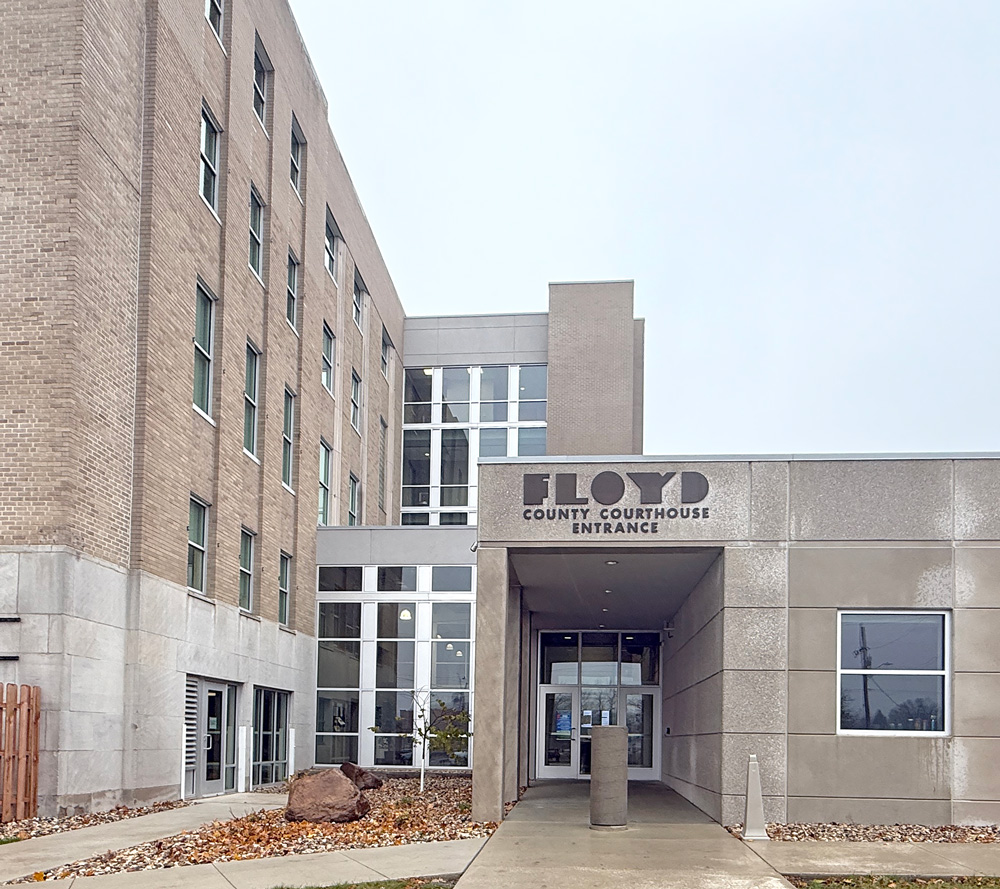Grassley ‘test drives’ new Winnebago all-electric motor home on Charles City tour

By Bob Steenson, bsteenson@charlescitypress.com
Chuck Grassley said he has ridden in an electric vehicle before, but he had never driven one.
The U.S. Senator can now add that to his list of accomplishments, after taking a new electric recreational concept vehicle for a quick loop around the parking lot at the Winnebago factory in Charles City Thursday morning.
“I’m on a par with President Biden, who was in Detroit and he drove a pickup that was entirely electric,” Grassley quipped.
The thing he noticed most about the electric motor home was how quiet it was, Grassley said.
The zero-emission “e-RV” was introduced by Winnebago earlier this month at the Florida RV Super Show as an example of the all-electric motor homes the company is developing.
The e-RV was developed by Winnebago’s Advanced Technology Group and is built on a Ford Transit chassis with an all-electric drive train, electrical appliances including heating and air conditioning designed to work efficiently with the RV’s 86-kWh battery, and sustainable materials including cork-rubber flooring and woolen wall appliques to enhance insulation.
The senator’s “test drive” was part of a tour of the Charles City Winnebago plant, notching Floyd County off the list of Iowa’s 99 counties that Grassley has committed to visiting every one of, every year, for more than 40 years since he was elected to public office representing the entire state.
That practice of visiting every county in a state, every year — since adopted by many other politicians — has even become known as “the full Grassley.”
The facility Grassley toured Thursday assembles smaller van-based motor homes, as well as fabricating parts for other assembly lines. Another Winnebago plant next door, the Charles City Hardwoods Facility, also supplies wood components for various other Winnebago assembly lines.
Grassley’s tour was was followed by a question-and-answer period with plant employees and invited guests selected by the Charles City Chamber of Commerce.
Some political opponents have said that Grassley’s pledge to have a meeting in every county falls short because many of those meetings such as the one Thursday morning are not open to the public.
But Grassley said he also likes to have meetings at businesses because those employees probably couldn’t get off work to attend a public meeting.
“It gives me a chance to have dialogue with people, answer your questions, because you can’t represent people if you don’t know what’s on their minds,” he said.
Grassley said he appreciated the chance to visit the Charles City Winnebago facility.
People are familiar with the Winnebago name, he said, but it surprises him as he visits different communities in the state to learn the wide range of things that are made in Iowa.
“We don’t brag enough,” he said. “I’m kind of really shocked some of the great things we do in Iowa that we don’t talk about very much.”
Grassley opened the Q&A by telling the couple of dozen people in the room that they could ask any question, about any topic.
“There’s not such a thing as an inappropriate question, so you don’t need to worry about what you want to ask about me personally, about what’s going on in Washington with various issues or what’s wrong with Washington, or maybe some of you just want to vent your anger towards me,” he said. “All that stuff is legitimate.”
Grassley answered almost a dozen questions on a range of issues.
Floyd County Supervisor Doug Kamm asked his opinion on the proposed carbon dioxide pipelines, and Grassley said it was a state issue and would likely stay that way, but he encouraged people to take part in the hearings and provide their opinions, and he urged the companies to work with landowners and avoid using eminent domain as much as possible.
He said the pipelines are being proposed for Iowa because Iowa is the No. 1 producer of ethanol.
Regarding ethanol’s future, Grassley said he thinks the goal of getting to all-electric personal vehicles by 2035 is unrealistic, but the ethanol industry is also finding new uses for its product, including finding ways to use it as aviation fuel and to fuel farm equipment and other big engines.
Answering another question, Grassley said the rules are still being written on some incentive programs and grant programs for businesses, but if a business does apply for a grant and would like Grassley to write a letter of support for the application he would be happy to do so.
Charles City Council member DeLaine Freeseman asked about programs to help communities like Charles City get better broadband access, and City Development Director Mark Wicks added that Charles City is considered to already be served by broadband.
“Charles City is not considered an underserved community because we have broadband providers, but we can’t get service reliability and attention that we need, especially to bring business in,” Wicks said.
“We’re not considered underserved, but at the same time we’re not big enough to have the big cable companies say we’re going to help you get fiber to the home. We don’t qualify for any of the governor’s money because Charles City isn’t considered underserved.”
Grassley said part of the problem is the maps showing which areas are underserved and which ones aren’t are not accurate, but they are being redone and should be available sometime after March.
“Maybe you’ll find out something different for Charles City,” he said.
Several people asked questions on different aspects of the labor shortage.
Grassley said part of the problem is that in its reaction to 22 million people being unemployed at the height of the COVID-19 pandemic, the government starting paying people more to not work than to work.
Some people were able to save enough that they still don’t have to go back to work, and others decided this was their opportunity to try and go into business for themselves instead of being an employee.
Asked if immigration was part of the answer to bringing in new workers, Grassley said it would be easy to get agreement on a couple of areas of immigration reform, for unskilled and ag workers and for highly educated skilled workers, but “when this new administration came in they opened the border — you see it on television every night” and now it will be harder than ever to come to an agreement on immigration issues.
Jim Davis, a staunch Democrat, thanked the Republican senator for his support of the Biden administration’s infrastructure bill.
Grassley said it was the right thing to do, and even though he and the other handful of Republicans who supported it were criticized by others in their party, it was important to bring some of that money to Iowa, which leads the nation in the percentage of its bridges that need repair, and which will benefit from improvements made to the locks and dams on the Mississippi River.
Grassley said he has not supported further expansions of the bill, saying the trillions of dollars that have been allocated is enough.
The 88-year-old senator, who is serving his seventh six-year term, having been in office since 1980, was asked why he decided to run for re-election.
“I waited a long time to make a decision to run,” he said. “When you get in your 80s you have to give it a lot of thought.”
He spent a lot of time talking with his wife and kids, he said.
“Over the summer I still didn’t have my mind made up,” he said. “But then you go to the State Fair and walk around there for a couple of days, and you go tailgate at the fall games, … and people come up and say, ‘With that mess we’ve got in Washington, we need in you in Washington, too,’ so I decided to run.”













Social Share